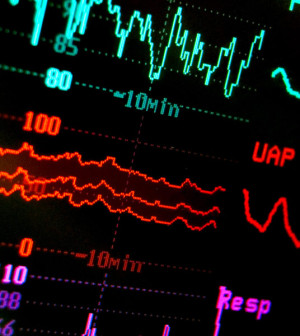- Could Your Grocery Store Meat Be Causing Recurring UTIs?
- Are You Making This Expensive Thermostat Error This Winter?
- Recognizing the Signs of Hypothyroidism
- 10 Strategies to Overcome Insomnia
- Could Artificial Sweeteners Be Aging the Brain Faster?
- Techniques for Soothing Your Nervous System
- Does the Water in Your House Smell Funny? Here’s Why
- Can a Daily Dose of Apple Cider Vinegar Actually Aid Weight Loss?
- 6 Health Beverages That Can Actually Spike Your Blood Sugar
- Treatment Options for Social Anxiety Disorder
Stress Management Training May Help Cardiac Rehab Patients

The addition of stress management training can make cardiac rehabilitation programs more effective, a new study indicates.
“Cardiac rehabilitation programs do not routinely offer stress management, but this may change should demand increase. And because patients may be reluctant to ask for the programs themselves, the onus is on the physicians to recognize that stress management is important for the optimal medical management of patients,” said study author James Blumenthal. He is a professor of psychiatry and behavioral sciences at Duke University School of Medicine, in Durham, N.C.
In the study, the researchers looked at 151 heart patients, aged 36 to 84, in North Carolina. The patients received either 12 weeks of exercise-based cardiac rehabilitation alone or the same program along with weekly 90-minute group sessions on stress management.
The stress management program included training in relaxation, coping skills and stress reduction.
Another 75 patients were in a control group that did not take part in cardiac rehabilitation.
After a median follow-up of more than three years, problems such as heart attack, stroke, recurrent chest pains requiring hospitalization, and death had occurred in 18 percent of patients in the cardiac rehab/stress management group. That compared to 33 percent of patients in the cardiac rehab-only group, and 47 percent of patients in the control group.
The study was published March 21 in the journal Circulation.
Only 20 percent to 30 percent of heart patients who are eligible for cardiac rehabilitation take part in stress management programs, possibly due to lack of access, cost or low doctor referral rates, Blumenthal said.
Some patients try to do cardiac rehabilitation on their own, but despite “their good intentions, making lifestyle changes is not an easy thing to do without assistance,” he said in a journal news release.
More information
The U.S. National Heart, Lung, and Blood Institute has more about cardiac rehabilitation.
Source: HealthDay
Copyright © 2026 HealthDay. All rights reserved.










